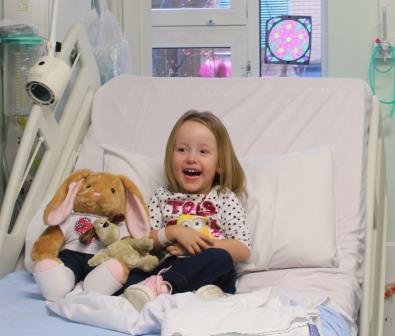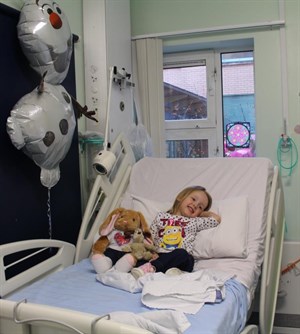28 January 2015
First dedicated children’s in-patient neurorehabilitation unit in the South West opens at Bristol Royal Hospital for Children

Patients and their families have started moving in to the first
dedicated in-patient neurorehabilitation unit in the South West at
Bristol Royal Hospital for Children. The new unit, which is only
one of a few in the UK, will provide rehabilitation by a highly
experienced interdisciplinary team for children with a range of
neurological conditions including those who have sustained acute
brain injury or spinal cord injury from trauma or infection or
patients who need intensive rehabilitation following selective
dorsal rhizotomy surgery for cerebral palsy.
Patients who sometimes need to stay in hospital for long periods
will benefit from the new in-patient unit which offers a a more
home like environment within the Bristol Children's Hospital. The
eight bedded unit is made up of a bay of four beds and four
cubicles for patients who are at higher risk of infection. Two beds
on the unit have been set aside specifically for selective dorsal
rhizotomy (SDR) patients who require intensive physiotherapy and
rehabilitation after their procedure. The remaining six beds will
be available for patients recovering from a neurological illness,
brain injury or spinal cord injury who still require further
clinical support at the hospital, including speech and language
therapy, play therapy, occupational therapy and neuropsychology.
Children are also able to attend the hospital school.
The unit has a neurorehabilitation discharge planning
coordinator who liaises with the local teams to ensure that the
specific needs of the child are in place when the child is
discharged from hospital. more home like environment within
the Bristol Children's Hospital. The eight bedded unit is made up
of a bay of four beds and four cubicles for patients who are at
higher risk of infection. Two beds on the unit have been set aside
specifically for selective dorsal rhizotomy (SDR) patients who
require intensive physiotherapy and rehabilitation after their
procedure. The remaining six beds will be available for patients
recovering from a neurological illness, brain injury or spinal cord
injury who still require further clinical support at the hospital,
including speech and language therapy, play therapy, occupational
therapy and neuropsychology. Children are also able to attend the
hospital school.
 Rosemary Cussen, Ward
Sister for Neuroscience, said: We are delighted to have opened a
new Rehabilitation Unit for children who need to stay in hospital
after a neurosurgical procedure, neurological illness or brain
injury for further therapies to ensure they have the best outcome
possible.Peta Sharples, consultant paediatric neurologist and
clinical lead for neurorehabilitation at Bristol Children's
Hospital, said: "Bristol is the only acute NHS hospital in England
to have agreed specific funding arrangements for children needing
neurorehabilitation with commissioners. These funding
arrangements have made the new unit possible. The
interdisciplinary neurorehabilitation team were previously based at
the Frenchay Barbara Russell Children's Unit and transferred to the
Bristol Children's Hospital last year as part of a strategic plan
to centre all specialist services for children on one site."
Rosemary Cussen, Ward
Sister for Neuroscience, said: We are delighted to have opened a
new Rehabilitation Unit for children who need to stay in hospital
after a neurosurgical procedure, neurological illness or brain
injury for further therapies to ensure they have the best outcome
possible.Peta Sharples, consultant paediatric neurologist and
clinical lead for neurorehabilitation at Bristol Children's
Hospital, said: "Bristol is the only acute NHS hospital in England
to have agreed specific funding arrangements for children needing
neurorehabilitation with commissioners. These funding
arrangements have made the new unit possible. The
interdisciplinary neurorehabilitation team were previously based at
the Frenchay Barbara Russell Children's Unit and transferred to the
Bristol Children's Hospital last year as part of a strategic plan
to centre all specialist services for children on one site."
"The Unit has an area called The Den where children can play and
sit at the table to have their meals, watch DVDs or television and
socialise with other children, away from their hospital beds. We
hope this home from home environment is a comfort to children and
their families who may need to stay in hospital for a long period
of time.
"The same staff work on the acute Neuroscience Ward and the
Rehabilitation Unit ensuring continuity for the children in our
care on their road to recovery."
Imogen Ashwell-Lewis was the first patient to move into the
neurorehabilitation ward with her mum, Catherine Ashwell-Rice.
Imogen is currently receiving intensive physiotherapy at Bristol
Children's Hospital following an SDR operation. Catherine said:
"The new unit is great. There is space to play and a table the kids
can sit at to eat their food together, just like we would at home.
We've got a lot of the comforts of being at home, but with the
reassurance that medical staff are on hand if required. Here, I
know that Imogen can get the physiotherapy she needs, and I can
continue to provide her with the care that I will once we leave the
hospital."
 BACK TO NEWS
BACK TO NEWS










